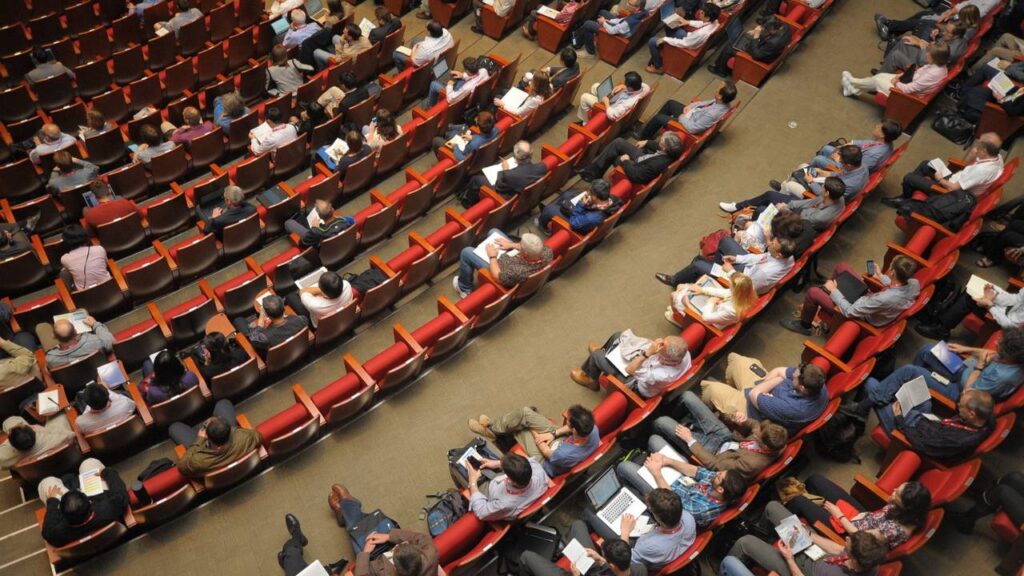Corporate events are undergoing a significant transformation. As technology advances and societal expectations shift, the ways in which companies gather their teams and clients are rapidly evolving. Hybrid events, which blend in-person and virtual experiences, are on the rise. This trend allows you to elevate your business event by reaching a broader audience and reducing logistical barriers.
Another trend making waves is the focus on sustainability. Corporate events are increasingly adopting eco-friendly practices. From reducing waste to choosing sustainable venues, companies are keen to showcase their commitment to environmental responsibility.
Personalisation is also becoming a key component. Tailoring experiences to meet the specific preferences and needs of attendees can significantly enhance the impact of your event. Using data-driven insights, you can curate content and activities that resonate with your audience, making your corporate gatherings more engaging and memorable.
Emerging Technology Trends in Corporate Events
In 2024, several technological trends are shaping corporate events, including AI for enhancing event management, VR and AR to create immersive experiences, and data analytics for deeper engagement.
AI and Event Technology Enhancement
Artificial intelligence is revolutionising the corporate event landscape. AI tools, such as ChatGPT, are being used to automate administrative tasks, allowing event planners to focus on more strategic activities. Personalised recommendations powered by AI can enhance attendee experiences by suggesting sessions, networking opportunities, and even catering options based on individual preferences.
AI experimentation in event technology encompasses chatbots for real-time assistance and facial recognition for seamless check-ins. Such innovations not only streamline operations but also improve security and attendee satisfaction. As AI advances, expect smarter digital tools that make events more interactive and engaging.
VR and AR for Immersive Experiences
Virtual reality (VR) and augmented reality (AR) are transforming how attendees experience corporate events. VR can create fully immersive environments for product demonstrations, virtual tours, or training sessions, making them more engaging and memorable. This technology allows attendees to interact with 3D models and simulations, providing hands-on experiences without physical constraints.
AR enhances live events by overlaying digital information onto the physical world. It can be used for interactive exhibits, real-time translations, and augmented presentations. By integrating VR and AR, you can offer a richer, more dynamic experience that captivates attendees and sets your event apart.
Data Analytics Transforming Engagement
Data analytics is a powerful tool for understanding and enhancing attendee engagement. By collecting and analysing data from various touchpoints, you can gain insights into behaviours, preferences, and feedback. This information helps tailor future events to better meet attendees’ needs and improve satisfaction.
Real-time data collection during events enables on-the-fly adjustments, such as modifying session topics or reallocating resources to high-demand areas. Analytics can also measure the effectiveness of marketing efforts and identify trends, allowing for more strategic decision-making. Ultimately, leveraging data analytics ensures more impactful and successful corporate events.
The Evolution of Corporate Events

Corporate events are witnessing a transformation, with a move towards hybrid formats, a focus on experiential interactions, and an emphasis on sustainability.
Transition to Hybrid Events
Hybrid events combine physical gatherings with virtual elements, expanding reach and accessibility. You can attend in person or join online, offering flexibility and convenience. This approach became a necessity during the pandemic and has since become a staple.
For corporate events, hybrid models mean engaging both in-person and virtual attendees seamlessly. Techniques such as live streaming, interactive polls, and virtual networking rooms enhance participation. Ensuring a smooth technical experience is critical. The blend of formats offers advantages like reduced travel costs and the potential to tap into a global audience.
Hybrid events also cater to different comfort levels and preferences. By incorporating robust digital platforms, they cater to those unable to be physically present, without sacrificing the engagement of traditional events.
Experiential and Experience-First Events
Experiential events prioritise creating memorable and immersive experiences. Rather than passive attendance, you engage through interactive setups, hands-on activities, and personalised journey maps. This focus fundamentally changes the nature of corporate events.
Using technology, such as augmented reality (AR) and virtual reality (VR), these events can transport you into different scenarios, enriching your interaction with the brand or message. Experiences might include product demonstrations, live simulations, or creative workshops. The main objective is to make you feel part of the event.
Experience-first strategies also include customisation. Personalised agendas, curated content, and targeted networking opportunities make each attendee’s experience unique. This shift towards engaging, tailored experiences helps reinforce brand loyalty and ensures that the event leaves a lasting impression.
The Role of Sustainability
The push for sustainability in corporate events is stronger than ever. Businesses now seek eco-friendly practices to reduce environmental impact. This includes using recycled materials, reducing waste, and sourcing locally produced food.
You’re likely to see a significant reduction in single-use plastics and an increase in digital alternatives like e-tickets and online brochures. Additionally, hybrid events contribute to sustainability by lessening the need for travel. Sustainable venues use renewable energy, and carbon offset programmes are becoming standard practice.
Event planners are also adopting green certifications and encouraging sustainable behaviour among attendees. This commitment to sustainability not only benefits the planet but also enhances the company’s image and aligns with the values of environmentally conscious participants.
Strategies for Enhancing Attendee Engagement
Effective engagement strategies can transform corporate events into memorable experiences. By focusing on innovative networking, personalisation, and interactive elements, you can ensure that your attendees remain engaged and connected throughout the event.
Innovative Networking Opportunities
Creating unique networking opportunities can greatly enhance attendee engagement. Consider organising small, themed breakout sessions where participants can discuss specific topics relevant to their roles or interests. Another effective approach is to use technology, like matchmaking apps, which help attendees connect with those who share similar professional interests. Speed networking sessions provide a structured way to meet a larger number of peers in a shorter time. Emphasising creativity in networking can result in stronger connections and a more dynamic event atmosphere.
Personalisation in Event Design
Customising the event experience is a powerful way to boost engagement. By incorporating personalisation, you make each attendee feel valued and recognised. One way to achieve this is by using data from pre-event surveys to tailor sessions and activities according to attendees’ preferences. Technology can aid in crafting individualised agendas, ensuring that each participant’s interests are met. A company like Vinehall Dublin can assist in creating bespoke experiences, enhancing the overall impact. Personalisation also extends to communication – addressing attendees by name and crafting messages that resonate personally will make your event stand out.
Gamification and Interactive Elements
Integrating gamification and interactive elements can significantly increase engagement levels. Consider adding gamified components, such as leaderboards, point systems, and rewards for participating in sessions or completing tasks. Interactive workshops, where attendees can actively participate rather than just listen, foster a more engaging learning environment. Utilising apps or devices that incorporate augmented reality (AR) or virtual reality (VR) can immerse attendees in a unique experience, making the event more memorable. Gamification not only keeps the event lively but also encourages continuous participation and interaction.
By adopting these strategies, you can create a corporate event that not only attracts attendees but also keeps them actively involved and engaged.
Diversity, Equity, and Inclusivity in Corporate Events

The future of corporate events is set to embrace diversity, equity, and inclusivity (DE&I) as fundamental elements. Companies are recognising the importance of creating events that not only reflect but celebrate their diverse audiences.
Promoting DE&I through Event Planning
When planning corporate events, it’s crucial to consider representation and accessibility. Ensuring that speakers come from a variety of backgrounds promotes diversity and offers multiple perspectives. You should also think about the accessibility of venues and materials. Providing sign language interpreters, captioning, and dietary options that cater to various cultural and religious preferences enhances inclusivity and signals that all attendees are valued.
Selecting event themes and topics that resonate with diverse groups is another key aspect. By engaging with cultural advisors or DE&I experts, you can ensure that your event content is relevant and respectful. It’s vital to communicate clearly and openly about your commitment to DE&I, both before and during the event. This transparency can help foster trust and encourage participation from diverse communities.
Creating a Sense of Community and Belonging
Creating an atmosphere where everyone feels a sense of belonging goes beyond just having a diverse line-up. You should focus on interactive sessions that encourage collaboration and peer engagement. Consider hosting round-table discussions, workshops, and networking opportunities that allow attendees to share their experiences and insights. These activities help break down barriers and build a more inclusive community within your event.
Pay attention to the physical and emotional comfort of your attendees. Provide quiet rooms for those who may need a break from the hustle and bustle, and be attentive to the needs of underrepresented groups. Recognising achievements and contributions from diverse communities in your event promotions and during the event itself can also strengthen the sense of belonging.
By focusing on these elements, you can create corporate events that are not only inclusive but also enriching for everyone involved.
Connecting Through Technology and In-Person Interactions
Leverage technology to foster global connections while retaining the value of face-to-face interaction. Both approaches offer unique benefits and when combined, they can enhance engagement and participation.
Virtual Events and Global Connectivity
Virtual events have surged in popularity, allowing you to connect with participants around the world without geographical limitations. Technology such as live streaming, virtual reality, and interactive webinars can create a compelling and immersive experience.
You can benefit from flexible participation options, enabling attendees to join from their homes or workplaces. This increases accessibility and convenience, making it easier for a diverse audience to engage. The use of chat features and virtual breakout rooms facilitates meaningful interactions and networking among participants.
Additionally, data analytics tools help you understand audience behaviour and preferences, enabling more tailored content and personalised follow-ups. Investing in robust virtual platforms can also ensure a seamless and professional event experience.
The Future of In-Person Events
While virtual events are thriving, in-person events offer irreplaceable experiences, fostering deep connections and engagement. Face-to-face interactions build trust and rapport, which can be crucial in business contexts.
You can enhance in-person events with innovative technologies, like augmented reality and mobile apps, to improve attendee engagement and streamline event management. Personalised schedules, interactive maps, and instant updates can make participation more enriching and efficient.
Moreover, exclusive in-person experiences, such as live demonstrations, tactile product interactions, and networking dinners, can create lasting impressions and stronger relationships. Emphasising safety and health protocols is essential to ensure confidence and comfort among attendees, making in-person events both enjoyable and secure.
Marketing and ROI for Corporate Events

Corporate events are increasingly being used as powerful marketing tools and their success is measured through various data analytics. Companies aim to maximise their return on investment (ROI) while minimising costs and reimagining engagement.
Events Shift to Marketing Platforms
The events industry is moving towards using corporate events as comprehensive marketing platforms. Leveraging event technology, such as interactive apps and social media integrations, helps to create memorable experiences that can foster deeper client relationships.
Through live streaming and virtual attendance options, you can broaden your reach, engaging a global audience. These tools not only enhance real-time interaction but also gather valuable data. This information can be used to refine targeted marketing strategies, improving future campaigns and boosting ROI.
Measuring Success and Event Analytics
To gauge the success of your corporate events, it’s essential to focus on data analytics. By tracking metrics like attendee engagement, social media impressions, and the bounce rate from your event’s online platforms, you can get a comprehensive view of performance.
Analysing attendee feedback and engagement levels allows you to adjust future events for better results. Cost control remains crucial; balancing your budget against the benefits gained helps ensure a positive ROI. Transforming these insights into concrete action can significantly improve the effectiveness of upcoming events.
Sustainable and Localised Event Management
Emphasising sustainable practices and supporting local communities can significantly enhance the eco-friendliness and social responsibility of corporate events. Focus on reducing carbon emissions and prioritising local food and community involvement.
Reducing Carbon Emissions
Reducing carbon emissions starts with choosing venues and suppliers committed to eco-friendly practices. Opt for locations powered by renewable energy and vendors who use energy-efficient systems.
Transportation is another major contributor. Encourage participants to use public transport or carpool, and provide virtual attendance options to minimise travel-related emissions.
Recycling and waste reduction are also crucial. Make recycling bins easily accessible and use digital alternatives to paper whenever possible. Implementing these measures shows your organisation’s commitment to sustainability and reduces your event’s environmental impact.
Prioritising Local Food and Communities
Supporting local food producers not only ensures fresher ingredients but also reduces the carbon footprint associated with transporting food over long distances. Partner with local caterers who source ingredients from nearby farms and markets.
Involving local communities in your event can boost social responsibility. Collaborate with local charities or social enterprises for event services, such as staffing or entertainment.
Engage with community leaders to identify opportunities for meaningful contributions. This approach not only enhances the local economy but also builds stronger community relations and showcases your organisation’s commitment to social and environmental responsibility.
Future-Focused Decision-Making in Event Planning
Incorporating future trends into corporate event planning ensures your event remains relevant and appealing. Leveraging LinkedIn and incorporating engaging team-building activities can enhance the human connections critical to successful events.
Leveraging Connections on LinkedIn
Using LinkedIn for event planning can amplify your reach and foster valuable networking opportunities. By creating event pages and groups, you can facilitate communication between planners and attendees. This platform allows for targeted invitations, ensuring that your event reaches the right professionals.
LinkedIn also provides insights into attendee interests and professional backgrounds, aiding in more tailored content. You can utilise LinkedIn’s analytics to measure engagement and refine your approach for future events. Engaging with attendees on LinkedIn before, during, and after the event strengthens professional relationships and increases overall participation.
Team-Building Activities for Engagement
Team-building activities play a key role in fostering engagement and collaboration among attendees. These activities should be thoughtfully designed to be inclusive and accessible for all participants. Consider a mix of physical, social, and intellectual challenges to cater to diverse preferences and abilities.
Incorporating technology can enhance team-building experiences. Virtual reality and augmented reality activities offer novel ways to connect attendees. Selecting venues with appropriate spaces for team-building activities is essential to ensure smooth execution. These experiences not only enhance attendee engagement but also create lasting memories and stronger connections.
Conclusion
As you look ahead, corporate events are set to become more engaging and personalised.
Technology will play a pivotal role, with virtual and hybrid events becoming more sophisticated. You can expect innovations like augmented reality and AI to enhance attendee experience.
Sustainability will continue to be a priority. By choosing eco-friendly venues and reducing waste, your events can appeal to environmentally conscious participants.
Employee well-being features prominently in future trends. You may see more wellness activities, mindfulness sessions, and healthy catering options at events.
Diversity and inclusion will be significant. Ensuring diverse representation in speakers and inclusive policies can make your events more welcoming.
Keeping these trends in mind will help you design corporate events that are not only innovative but also meaningful and impactful.
